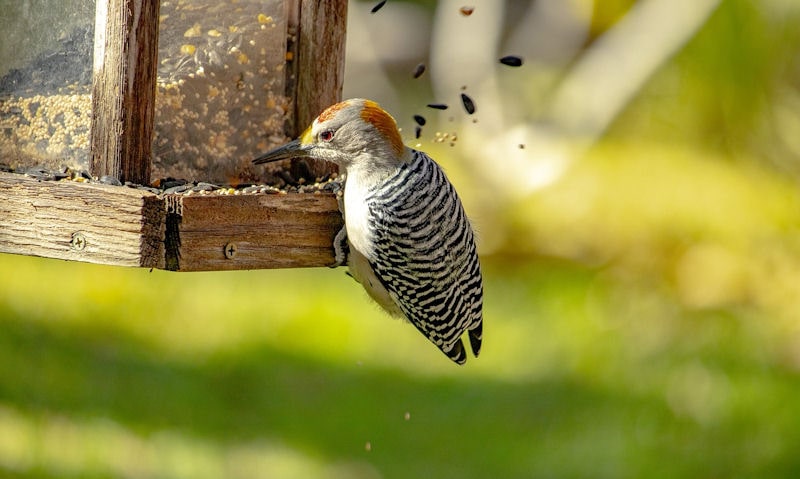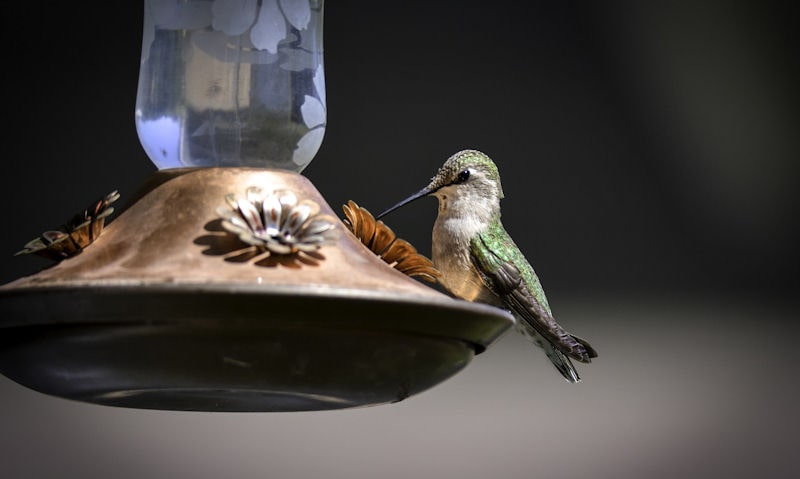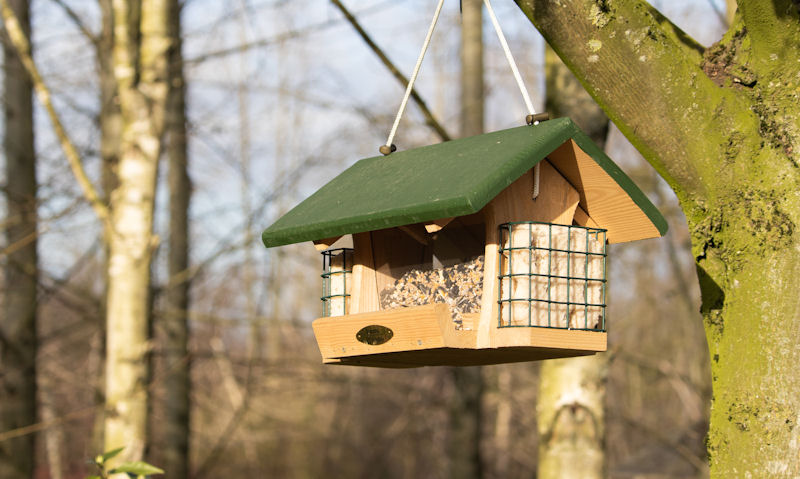How to stop birds from wasting food
Birds will naturally waste bird food as its commonly seen as they crush on shelled seeds or nuts, but in truth it just could be wild birds don't eat as much as you think.
Birds may not be wasting bird food when in fact it could be you, continuing to overfill feeders, with food expiring before its given time to be eaten. Stop wasting food by only replenishing their favorite bird feed only a third in feeders; all while food laid on the ground will insure all size or less able birds can eat.
I don't believe anyone can be sure 100% of what can be expensive bird food is eaten in the garden, as its a birds natural behavior to waste feed as they proceed to ingest it.
Most bird food is wasted as people tend to overfill bird feeders with bird food that can last months, when in fact the food inserted into feeders will only have a week or two in the feeder, before its seen to deteriorate, and eventually rot with bacteria.
You can never have too many bird feeders for all kinds of bird feeder food, but that doesn't mean you must fill them up to the top, every time you replenish the feeders.
I encourage you to only use one or two fat balls at a time for example, to see how quickly they are consumed. Only then will you understand how much or little is eaten.
Similarly, only replenish seed or peanut bird feeders a quarter or a third of the way up, because only then can you begin to count down the days it took for the food to disappear; which will give you an idea how long it took for this little amount of seeds or nuts to be gobbled up by your wild birds.
Don't limit yourself on how to attract and feed birds via a bird feeder only, when you can quite successfully attract birds without a feeder holding you back.
Benefit to that is bird feeder birds can still be fed on open areas in the yard - like trees or on the shed roof - while ground feeding birds can now access the food readily available.
And so can large unwanted birds but it shouldn't be a worry when they can simply clean up what isn't eaten or even found by your common Robins, Sparrows or Jay's.
Stop overfilling feeders
Certainly the most effective way of wasting what can be quite expensive bird food, is not to overflow the bird feeders with food.
Particularly when one group of bird food isn't going to be eaten as much in spring, when its seen to be eaten more so in wintertime... when wild birds prioritize fattier foods.
Stop overfilling your bird feeders to stop from wasting food, only then can you truly get a sense of how much or little bird food is eaten before it left too long out in the bird feeder. You won't get an exact measure first thing, but in due course you'll better understand how much food to add, for how long it will last.
Little or far more groups of bird food will be eaten seasonally, thus its important to remember popular bird food like peanuts or mealworms will be less vital weeks or months from now.
Overfilling bird feeders to the very top with seeds is a common mistake, although it will be eaten in time, even when many are seen to spill on the ground.
It will take time to get a proper idea of how much bird food to use, while gradually you'll also begin to understand certain times of the year will force you to reduce or increase bird food quantities.
Limit bird feeder food use
How else you'd stop wasting food is to limit how much of a certain bird food that you replenish bird feeders with.
Sure, certain bird food can attract the most birds to feed, thus its vital you prioritize this group of bird food whilst reducing or stopping all together - when re-filling feeders with less popular bird food.
Idea behind this is to concentrate wild birds efforts at a seed, peanut or any kind of suet you happen to be using.
Most birds will be seen to feed on all kinds of bird seeds, particularly cheaper seed mixes or sunflower seeds. On the negative side Nyjer or millet may be seen to be eaten less - thus to only feed birds sunflower seeds would see less seeds go to waste.
Peanuts are eaten less so and therefore its vital you use far less nuts until you find a level of peanuts that won't end up in the trash.
And don't rush out to clean up under bird feeders too soon, as your Pigeons, Blue Jay's, Sparrows, American Robins and Bluebirds will happily feed off the ground.
Bird seed tray an option
What else you can do is rather than focus too much of how little or much bird food to provide for your wild birds, you can simply keep the bird food within the bird feeder you happen to be utilizing.
What that can include is choosing what will probably be a seed bird feeder that is fixed with a tray.
This tray will act as a seed tray for birds to perch as they feed, although you will see less and less bird seeds drop to the ground. You can put bird seed on the ground so its vital to not get too hung up on spilled bird food, because it won't necessarily go to waste.
When opting for what is an open to the elements open tray surrounding what will be a seed, mealworm or nut feeder only - remember the bird food will be exposed to both the weather and larger birds who will raid your feeders at any given chance.
On the plus side stopping larger birds like pigeons eating your bird food may not always be the answer, when in fact they could be the solution to bird food not going to waste.
Default to wide open feeder
What you may not know about your common backyard birds is, while they can be seen to forage on the ground or up in trees within your yard, these same birds may not be able to access conventional hanging bird feeders.
While its easy to forget not all wild birds have the dexterity or agility to cling onto a small but hard to access bird feeder - this in truth is where bird food will be seen to waste.
Solution to that is would be to make sure any Sparrows, including less able at bird feeders' American Robins or Bluebirds; can and will feed if the availability of mealworms or seeds are accessible in more open to all feeders.
What these smaller but less able birds like, plus many large birds such as Cardinals, is an open to all wide feeding tray or platform feeder.
How this will stop bird food going to waste as much, is making sure all wild birds who frequent your yard, can feed when and what on, when the time arises.
Don't waste an opportunity to feed your birds when they come visiting, as bird food offered out in the open in seed trays, on platform feeders or put on the ground will insure all birds will eat, if given the opportunity.
No waste if fed on ground
While bird feeders are important for many of us to use, in a way which organizes your bird feeding routine, or to simply keep the area clean - let's not forget many, many wild birds are exclusive ground feeding birds only.
Whilst I encourage you to continue to replenish bird feeders hung up on a bracket or off a tree branch as normal; I can't emphasis it enough, bird food must be made available on the ground.
Ground being a small area of the lawn in a lit up area, where seeds or dried mealworms thrown under the hanging feeders will make sure its found by ground feeding birds.
On that note larger birds can't be discouraged from eating exposed bird food, but again its a great way of making sure bird food is eaten in a timely manner.
What kind of bird feed do large birds like which would be species you'd want to encourage, is mostly seeds or mealworms - with cardinals favoring seeds on the ground for example - rather than awkwardly tackling a small compact hanging feeder.
Summary
How to stop wild birds from wasting your bird food would first rely on the need to use less bird food in bird feeders.
In time you'll know when to use more or far less, depending on the time of year. But for now, you need to stop overfilling bird feeders as this is the most common mistake people will make when getting into backyard birding.
Result will be bird food going to waste but more importantly than that - bird seeds will be seen to dry up or peanuts will go rotten - even if they're still within their expiry date.
Limit bird food use to feed that is popular with your current crop of daily visiting birds, with seeds and fat balls shown to be a popular choice.
Concentrate bird food within feeders by utilizing a bird feeder tray to catch spillages, though it has to be said any spilled bird food will be eaten up by ground feeding birds, or birds who refuse to familiarize themselves with a bird feeder.
Default to a wide spill tray so even larger birds can perch to feed, while an open to all platform bird feeder will allow all bird species to share a space to feed.
Perhaps with the exception of hummingbirds who prefer to feed in isolation on a feeder, but only if they're in small numbers; whereas a dozen or more hummers, will feel brave in numbers, and likely to share a hummingbird feeder with others species.
In the end, a bird feeder must still be used to cater to birds who forage at elevated areas, as they are not seen to eat off the ground. With that in mind, there's no harm in throwing seeds or mealworms over the lawn to make sure all birds get a nutritious meal.


